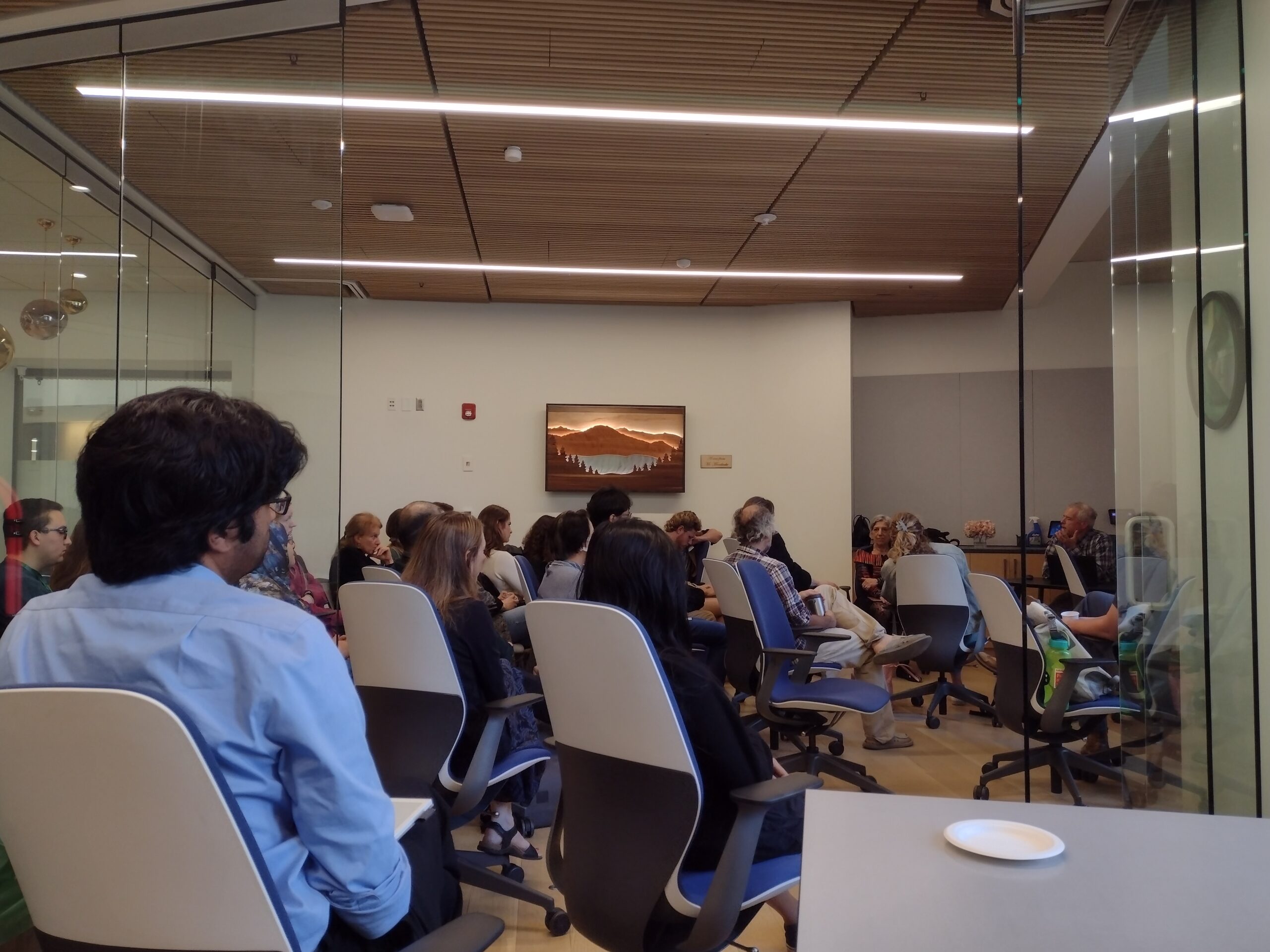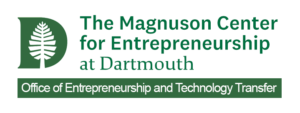Cancer Accelerator Participation Shapes Students’ Academic Paths and Career Aspirations
Eight of the ten teams in the current cohort of the Dartmouth Innovations Accelerator for Cancer have students playing pivotal roles.

When Ian Glick D’26 enrolled in Dartmouth as an undeclared undergrad, he never imagined that he’d be working to cure cancer and learning from leaders in biotech innovation alongside medical doctors, senior faculty, and doctoral candidates. And yet, that’s exactly that Glick, 20, is doing during his sophomore year as he participates in the Dartmouth Innovations Accelerator for Cancer (DIAC).
“To already have a hand in working to solve as huge a problem as cancer at this stage in my life and academic career is a huge privilege,” said Glick.
DIAC, which launched in 2020, aims to bring potentially lifesaving innovations out of Dartmouth labs and into the marketplace and the clinic. The accelerator is a partnership between the the Magnuson Center for Entrepreneurship and the Dartmouth Cancer Center. In addition to a curriculum developed in partnership with Simbex, a medical device and development company, teams have access to experienced entrepreneurs and investors that comprise DIAC’s External Review Panel (ERP). Eight of the ten teams participating in the current cohort of DIAC have student deeply involved in the program, a role that the young academics say has shaped their study, imbued them with hard and soft skills that will impact their careers, and allowed them to see the real-world impact of their scholarship.
"The accelerator has undeniably been a significant part of my academic journey,” said John H. Molinski, a sixth year PhD candidate who is participating in DIAC for the third time. “Though its programming, the connections it provided, and the resources it had provided, it has directly influenced my next steps post PhD.”
Academics, enhanced by entrepreneurship
Glick is participating in DIAC alongside Urjeet Khanwalkar, a PhD Graduate Student, and Margie Ackerman, PhD, Professor of Engineering and Program Lead for Biological and Chemical Engineering at Thayer. The team is developing nanoparticles that could be used to unlock B cell immunotherapies. This pathway could present a promising new modality to treat many diseases, including cancer.
Last fall, Glick pitched the team’s innovations to DIAC’s ERP, and he has represented the Ackerman team at many DIAC meetings, gaining hands-on experience that few sophomores have.
“I’ve pushed myself to be on the same presentation and research level as PhD candidates, postdocs, and even professors,” Glick said.
While Glick is one of the few undergraduates on a DIAC team, he embodies the student experience that is woven throughout the accelerator. In many cases, PhD candidates, like Sophie Lloyd, are spearheading the research.
Lloyd is a third year PhD candidate working in the Lab of Ryan Halter, PhD, Associate Professor of Engineering and Program Lead for Biomedical Engineering at Thayer, and Adjunct Associate Professor of Surgery at Geisel School of Medicine. As part of her thesis work, Lloyd is developing a hand-held device that doctors can use during surgery to measure tissue connectivity and determine whether cancerous cells remain in a patient’s body after a portion of tissue is removed. The device could eventually be used to speed treatment and help patients avoid painful biopsies.
Pursuing her thesis while participating in DIAC, with its emphasis on translating innovations to the market, has given Lloyd the best of two worlds, she said.
“I get the traditional PhD where you’re really going into your niche, but I also get to come back out to the broader scope of why this matters and how this niche can apply to different things,” she said.
Learning about market regulations and working closely with surgeons at Dartmouth Hitchcock has helped Lloyd refine prototypes of her device, while meetings with the ERP have helped her hone her pitch for a lay audience.
“I need to be able to tell people about it, and not just people with a scientific background,” Lloyd said.
Shaping the course of research
DIAC has taught students to approach their academic careers through a pointed question: how can this technology make a difference in the lives of patients?
“I am always trying to identify market gaps in my field and determine how my research might fill them,” said Melanie Peck, a second year PhD candidate in the Innovation PhD program.
Peck is on a DIAC team pursuing cytokine immunotherapy for solid tumors, led by Yina H. Huang, PhD, Professor of Microbiology and Immunology, and Pathology and Laboratory Medicine at Geisel. She chose Dartmouth for her doctoral work in large part because of the institution’s entrepreneurial ecosystem.
“The opportunities are undeniably unique compared with those that I had at the previous institute that I attended,” she said. “DIAC leverages its strong alumni network to design a really useful program for its students and faculty.”
The resulting program has shaped the research that Levi Olevsky and Peter Bertone are doing. The duo are second year PhD students in the lab of Dr. Katie Hixon, Assistant Professor of Engineering and Clinical Assistant Professor of Orthopedics at Thayer. Their DIAC team is exploring tissue engineering to promote bone regrowth.
“DIAC has directly influenced and driven our thought process with what we want to study, what data we want to get, what tools we want to use,” said Bertone. “It’s unlocked all kinds of possibilities for us to grapple with and jump off of.”
For Olevsky, who plans to go to medical school after obtaining his doctorate, the idea of classical PhD research was intriguing and fun. Yet DIAC has helped him tailor his research to have the most impact on patients. Most recently the team has pivoted to focus on craniofacial applications of their regenerative material.
The accelerator has also shown Olevsky that clinicians, researchers and engineers can work collaboratively, rather than in siloes, to create a more robust medical engineering sector that ultimately results in better treatments.
“This provides a foundation for me to bridge those sectors in the future,” Olevsky said.
The emphasis on clinical applications has also inspired Peck.
“I feel more motivated by my research after DIAC helped me see its real potential to be applied in a clinical setting,” she said.
A new perspective on science and entrepreneurship
Scholars participating in DIAC consider their academic work through the lens of government regulations, potential industry partners, and investors who will be instrumental in getting technology to patients.
Molinski, who works in the lab of John X.J. Zhang, Ph.D., Professor of Engineering at Thayer, had been studying the use of a new type of biomarkers for early diagnosis. Through the accelerator he realized the approach had potential as a novel therapeutic. He has used DIAC funding to gather preliminary data, which he is currently leveraging to apply for two grants through the National Science Foundation’s Small Business Innovation Research Program (SBIR).
The biggest impact, however, has been in how Molinski views himself. Prior to DIAC, he didn’t see himself as someone who would take the leap into entrepreneurship, he said, because he enjoys delving deeply into the science. Now, he has realized that scientific fidelity isn’t mutually exclusive from operating in an entrepreneurial space.
“I think what really sets DIAC apart from the other opportunities is that it meets the technology at an intersection, rather than guiding engineers, scientists, or clinicians to close that gap themselves,” he said. “The business side of things truly takes a different style of thinking and having that outside perspective has proven very valuable.”
The lessons from DIAC are valuable even for students with more diverse career aspirations. Jordan F. Isaacs, a sixth year PhD candidate, participated in DIAC twice, securing more than $350,000 in funding. Now, she is an intern for the program. She hopes to learn more about intellectual property diligence, a skill that she can apply to a career in patent law after graduation.
"I’ve had the privilege of observing firsthand the value DIAC adds to the Dartmouth entrepreneurial ecosystem, with opportunities to advance innovation through funding as well as business training,” she said. “There are few opportunities to have exposure to entrepreneurship or learn the business side of science. Participating in DIAC gives students and faculty the ability to supplement their technical training with an understanding of commercialization.”

